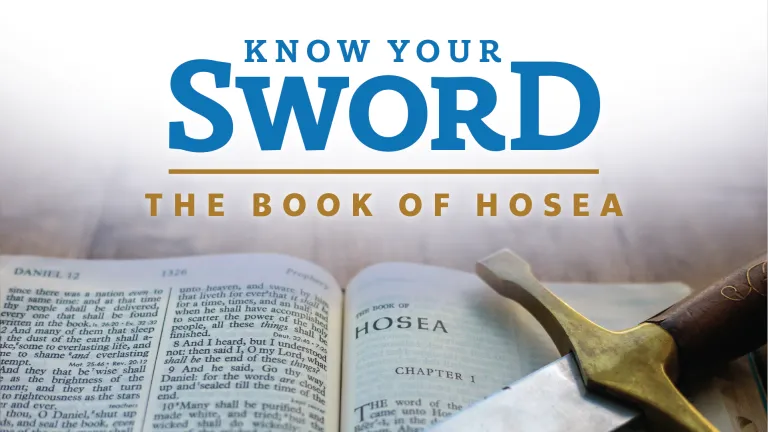Hosea Part 04

The plot continues . . . Gomer has gone into harlotry and Hosea is told to redeem her. The comparison with Israel is made plain in the words of chapters 3 and 4 with specific actions mentioned.
Hosea chapter 3 shows Hosea acting out what God has just prophesied. In verse 1 Hosea symbolizes God, who loves us, while we are still in our sins. The word used for “lover” is reya which means associate, companion, friend, lover or husband. This word shows how Hosea still loved Gomer even though she was committing adultery, just as God still loved Israel, even when they apostatized. In verses 2 and 3 we see Hosea had to buy her for fifteen shekels of silver. Normally, at that time a healthy, valuable slave would cost 30 pieces of silver, possibly showing that Gomer wasn’t worth much to her owner. There are two ways we can look at this. One, that God put Israel away, but still plans to redeem her. Or, that God loved us while we were sinners, and Christ paid with His life to buy us from the slavery of sin, just as Hosea bought Gomer out of slavery.
In Hosea 3:4, Israel is said to be “many days without these things as given from God.” This verse appears to speak of a time when Israel would be without its king, sacrifices, sacred items or guidance, pointing to a long period of spiritual desolation. To reconcile this with God’s promise to maintain David’s dynasty seems to refer to a united Israel. David’s lineage ruled over one or a few of the tribes of Israel—but not most of Israel. Some say the “many days” could be the 150 years or so between the conquest of Israel and the conquest of Judah, and the eventual transplanting of the dynasty of David back to a tribe of Israel. Hosea 3:5 tells us that in the millennium, David will rule Israel (under Christ, who is the King of Kings! [Ezekiel 37:24]). The phrase “The LORD” can mean the Father. His “goodness” means “gracious one.”
Hosea 4 begins a new prophetic utterance—a catalog of the people’s sins, which is an accurate description of current sins as well. In verse 1, Israel (meaning the northern 10 tribes) is brought to court, as God “brings a charge.” This phrase seems to refer to a legal case or suit. The phrase “no truth or mercy,” can also be translated from the Hebrew as “no faithfulness or loyalty,” which helps us understand why the name Lo-Ruhamah was given to Hosea’s daughter.
God had been faithful and loyal, but the Israelites had not. Verse 1 also states there is “no knowledge of God.” While there is lots of scientific and other sorts of knowledge, the Israelites were lacking knowledge of God, bringing about destruction.
Verse 2 lists several of the Ten Commandments that govern human relationships. The phrase “blood touches blood” implies one act of bloodshed after another—frequent murders. In verses 4–5, the Hebrew is difficult to translate precisely. Some translations show it as “don’t point fingers and blame others.” God has a complaint against the priests as much as anyone else: they stumble around (sin) in broad daylight. The phrase “your mother” here represents the nation of Israel.
Hosea 4:6 is a great memory scripture,
“My people are destroyed for lack of knowledge. Because you have rejected knowledge, I also will reject you from being priest for Me; Because you have forgotten the law of your God, I also will forget your children.”
Looking back to verse 1, we remember it’s the knowledge of God that they lack. Religious leaders who should (and sometimes do) know better, choose to reject the truth of the Bible. Here in Hosea it says they will be rejected by God. This shows the responsibility that religious teachers have to teach the true Word of God (James 3:1).
Verses 9–10 declare that God will punish both leaders and followers for their actions. “Whoredom” here means spiritual adultery—worshipping other gods (Jeremiah 2:11). Verse 11 contains another good memory scripture that warns how alcohol or other addictions can enslave a person’s will. In verses 12–14, the text refers to idol worship, which was usually done on hilltops. Again, sexual immorality is used to symbolize idolatry, but it is also a common and heinous sin of itself. It explains that God won’t punish the women more than the men—or without them.
In verses 15–16, Hosea warns about false worship centered in Gilgal and Beth Aven—places where Jeroboam had set up idols and altars, including the calves he erected (1 Kings 12:26–31). “Beth Aven” may be a sarcastic reference to “Bethel.” While Bethel means “house of God,” Beth Aven means “house of nothing” or “vanity” or even “house of iniquity.” This location was in Ephraim’s territory. Amos 5:5 confirms, “Bethel will come to nothing.”
In verse 17, Hosea begins using “Ephraim” to represent all of Israel, a practice we can also see in Jeremiah 31:9, where God says, “Ephraim is My firstborn.” Finally, Hosea 4:18–19 ends this section with a somewhat difficult and awkward translation. The text seems to mean that “Ephraim is irreclaimable” and “should be left alone in excessive drunkenness and idolatry.” The implication is clear: “What a shame!” Ephraim “will be swept away on the winds for sinfulness.” God will judge righteous judgment.
UYA Team | uya@ucg.org
United Young Adults (UYA) primarily serves the 18–32-year age group for the United Church of God. There are three main areas of contribution to the lives of the young adults: Promoting Spiritual Growth, Developing Meaningful Relationships and Making the Most of Your Talents. The Know Your Sword series is a daily expository message introducing God’s Word from a trusted perspective.

